Foreign institutional investors (FII) purchased shares worth net Rs 783.82 crore, while domestic institutional investors (DII) added shares worth net Rs 1,324.98 crore on November 28, 2023, according to the provisional data available on the NSE.
For the month till November 28, 2023, FIIs sold shares worth net Rs 4,317.90 crore while DIIs bought shares worth net Rs 11,139.82 crore. In the month of October, FIIs offloaded shares worth net Rs 29,056.61 crore while DIIs added equities worth a net Rs 25,105.86 crore.
“The gradual return of FIIs in the month of November post the global sell-off during the three months of (Aug to Oct) is having a steady positivity in India. However, currently the Indian market is facing resistance above to edge above 19,800 levels. Oil prices are stable ahead of the OPEC meeting and OMCs stand to benefit from the ease. Metal sector gained in line with expectations of Chinese stimulus, and PSU banks are doing well due to better peer performance. The market may await state exit polls for further cues, in the short-term,” said Vinod Nair, Head of Research at Geojit Financial Services.
Previously, on Tuesday, the NSE Nifty 50 gained 95 points or 0.48% to settle at 19,889.70, while the BSE Sensex jumped 204 points or 0.31% to 66,174.21.
Foreign institutional investors (FII) or Foreign portfolio investors (FPI) are those who invest in the financial assets of a country while not being part of it. On the other hand, domestic institutional investors (DII), as the name suggests, invest in the country they’re living in. Political and economic trends impact the investment decisions of both FIIs and DIIs. Additionally, both types of investors – foreign institutional investors (FIIs) and domestic institutional investors (DIIs) – can impact the economy’s net investment flows.

